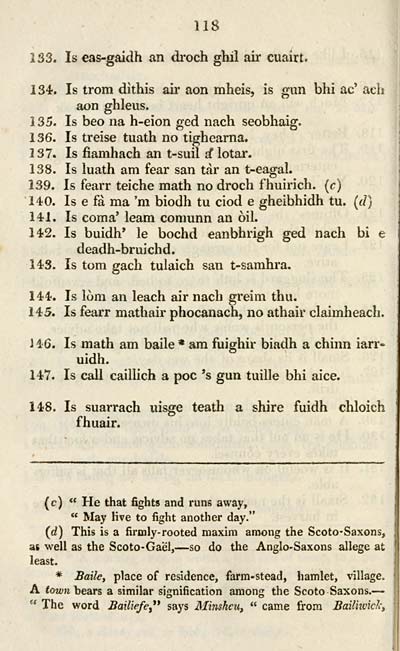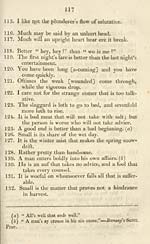Download files
Complete book:
Individual page:
Thumbnail gallery: Grid view | List view

118
133. Is eas-gaidh an droch ghil air cuairt.
134. Is trom dithis air aon mheis, is gun bhi ac' ach
aon ghleus.
135. Is beo na h-eion ged nach seobhaig.
136. Is treise tuath no tighearna.
137. Is fiamhach an t-suil d lotar.
138. Is luath am fear san tar an t-eagal.
139. Is fearr teiche math no droch fhuirich. (c)
140. Is e fa ma 'm biodh tu ciod e gheibhidh tu. (d)
141. Is coma' leam comunn an oil.
142. Is buidh' le bochd eanbhrigh ged nach bi e
deadh-bruichd.
143. Is torn gach tulaich san t-samhra.
144. Is lorn an leach air nach greim thu.
145. Is fearr mathair phocanach, no athair claimheacli.
J 46. Is math am baile * am fuighir biadh a chinn iarr*
uidh.
147. Is call caillich a poc 's gun tuille bhi aice.
148. Is suarrach uisge teath a shire fuidh chloich
fhuair.
(c) " He that fights and runs away,
" May live to fight another day."
(d) This is a firmly-rooted maxim among the Scoto-Saxons,
as well as the Scoto-Gael, — so do the AnglO'Saxons allege at
least.
* Baile, place of residence, farm-stead, hamlet, village.
A town bears a similar signification among the Scoto Saxons. —
" The word Bailiefey* says Minshcu, " came from BaUhvid;
133. Is eas-gaidh an droch ghil air cuairt.
134. Is trom dithis air aon mheis, is gun bhi ac' ach
aon ghleus.
135. Is beo na h-eion ged nach seobhaig.
136. Is treise tuath no tighearna.
137. Is fiamhach an t-suil d lotar.
138. Is luath am fear san tar an t-eagal.
139. Is fearr teiche math no droch fhuirich. (c)
140. Is e fa ma 'm biodh tu ciod e gheibhidh tu. (d)
141. Is coma' leam comunn an oil.
142. Is buidh' le bochd eanbhrigh ged nach bi e
deadh-bruichd.
143. Is torn gach tulaich san t-samhra.
144. Is lorn an leach air nach greim thu.
145. Is fearr mathair phocanach, no athair claimheacli.
J 46. Is math am baile * am fuighir biadh a chinn iarr*
uidh.
147. Is call caillich a poc 's gun tuille bhi aice.
148. Is suarrach uisge teath a shire fuidh chloich
fhuair.
(c) " He that fights and runs away,
" May live to fight another day."
(d) This is a firmly-rooted maxim among the Scoto-Saxons,
as well as the Scoto-Gael, — so do the AnglO'Saxons allege at
least.
* Baile, place of residence, farm-stead, hamlet, village.
A town bears a similar signification among the Scoto Saxons. —
" The word Bailiefey* says Minshcu, " came from BaUhvid;
Set display mode to: Large image | Transcription
Images and transcriptions on this page, including medium image downloads, may be used under the Creative Commons Attribution 4.0 International Licence unless otherwise stated. ![]()
| Early Gaelic Book Collections > Blair Collection > Mackintosh's collection of Gaelic proverbs, and familar phrases > (138) |
|---|
| Permanent URL | https://digital.nls.uk/80463742 |
|---|
| Description | A selection of books from a collection of more than 500 titles, mostly on religious and literary topics. Also includes some material dealing with other Celtic languages and societies. Collection created towards the end of the 19th century by Lady Evelyn Stewart Murray. |
|---|
| Description | Selected items from five 'Special and Named Printed Collections'. Includes books in Gaelic and other Celtic languages, works about the Gaels, their languages, literature, culture and history. |
|---|

